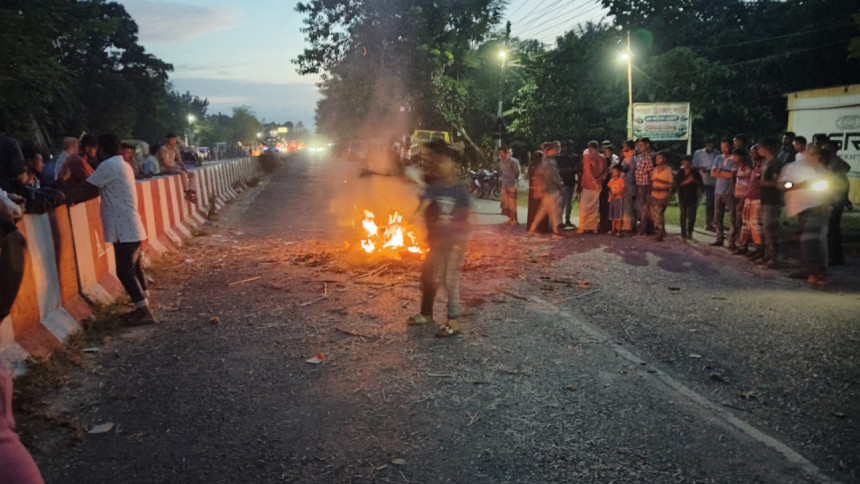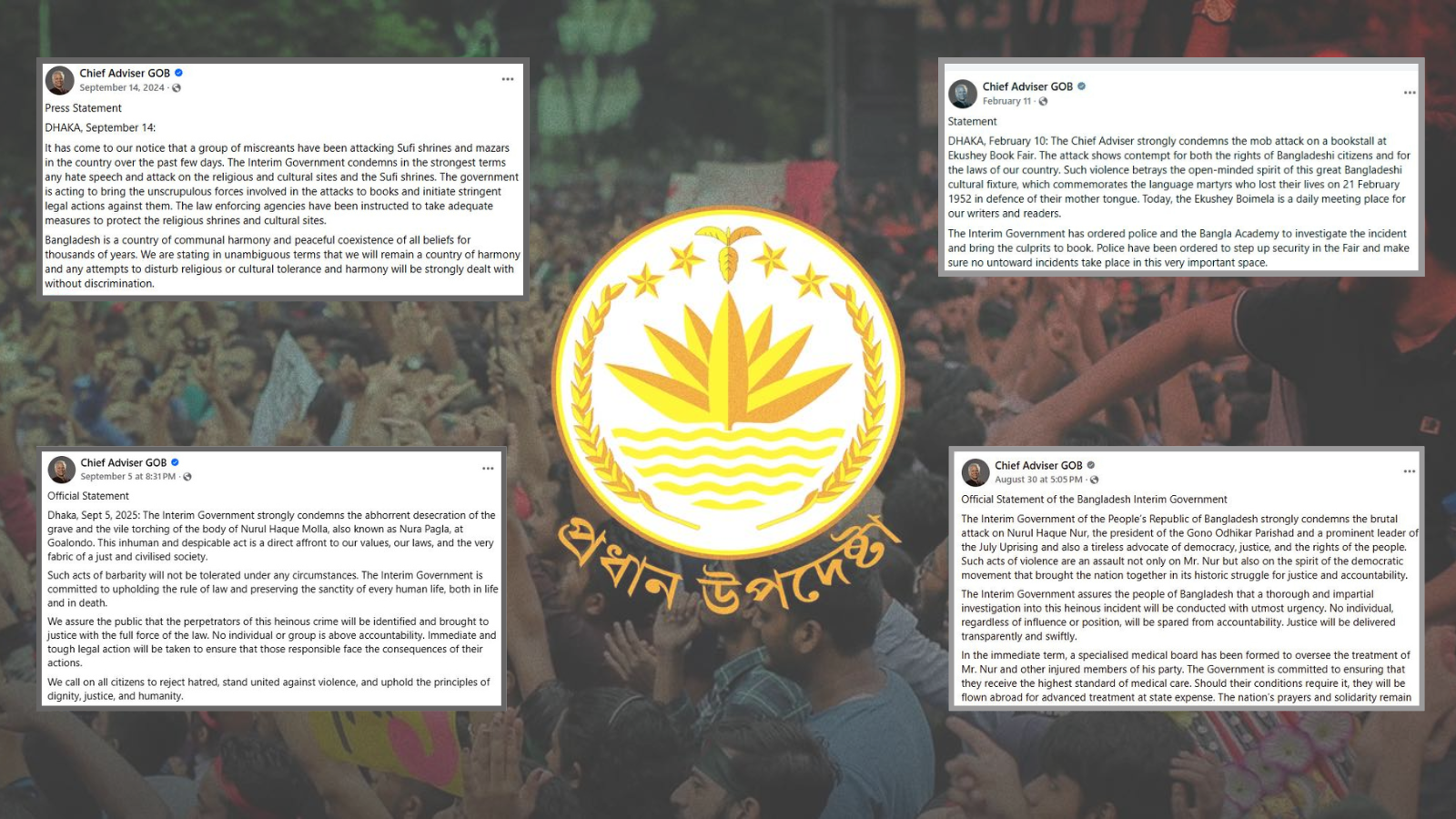When the state falters, the streets make the rules

Every morning now begins with a negotiation. Will the university gates open for classes or chaos? Will Shahbagh hold under the slogans and horns, or collapse into confusion? Will the thin line between rally and riot stay thin, or snap? Bangladesh is living through what I call daily un-governmentality—an everyday sense that order is temporary, bargained over by megaphones and hashtags.
Recently at Chittagong University, clashes between students and locals left hundreds injured; classes were closed, and Section 144 imposed, before the campus choked on tear gas and rumour. Around the same time, engineering students—Buet and their peers nationwide—moved from exam halls to city arteries, shutting down traffic and facing batons with the demand for recognition and a fair path from study to work. These are not stray sparks. This is the new weather.
When authority falters, everyone learns the choreography of defiance. Last year's uprising—born in a dispute over quotas, baptised in blood—retrained a generation. A UN fact-finding report estimated that up to 1,400 people were killed in a matter of weeks. The lesson young people drew is brutally simple: institutions don't listen until the road is blocked. Add to that the maths: nearly 40 percent of 15-24-year-olds are NEET (not in education, employment or training), and 60 million active social media users able to turn a grievance into a citywide shutdown. And you get a polity where governance is performed after disruption, not before it.
We've seen this before, just elsewhere, in other costumes. Consider Thermidorian France (1794-95). The Terror ends, Robespierre falls, but peace does not follow. Instead comes a carnival of revenge. The White Terror sweeps the streets; the muscadins—gilded youth in scented cravats—beat Jacobins with canes while the state looks away. When the Directory finally asserts itself, it does so with grapeshot—Napoleon clearing Parisian boulevards with artillery to restore "order." The lesson is clear: when the state's monopoly of force is absent or uncertain, rival young men improvise one of their own. We remember the cannonade, but forget the drift that invited it.
Or consider Russia after February 1917. The tsar falls and "dual power" enters. The Provisional Government holds the parchment; the Soviets hold the streets. Order No. 1 tells soldiers to obey officers only if the Petrograd Soviet agrees. Factories elect committees. The command chain dissolves into parallel signatures. Authority multiplies; compliance fractures. No one knows whose "law" will govern any given day. In that unstable chemistry, the most disciplined minority wins.
Fast-forward to Cairo, post-Arab Spring. The square sings, the president falls, and the system re-learns its oldest trick: ban the street, prize the file. Law 107 effectively criminalises assembly; universities, once engines of dissent, are policed into submission. A security state governs by pre-emption and paperwork, while unemployment and blocked mobility fester below. The public sphere is pacified, but legitimacy never returns.
These three stories rhyme in Bangladesh today. Our youth do not wake as nihilists, they wake as accountants of credibility. Who can give an order that feels like law rather than a dare? Where is the procedural justice that makes compliance rational? When do promises turn into pay cheques or admission letters? If the answers are vague, the road appears, because the road, lately, works.
Political science has language for this. Samuel Huntington warned that when mobilisation outruns institutionalisation, politics decays into a contest of disruptions—a race between new social energies and the state's capacity to absorb them into rules. That is where we stand now: a society that mobilises in hours, and institutions that respond in months. Charles Tilly adds that people learn repertoires of contention. If roadblocks and campus occupations worked last season, they become the default this season; imitation beats deliberation. And James Scott reminds us that resistance is not only spectacular but everyday: slow refusals, small sabotages, foot-dragging—the quiet cousins of headline riots. Put together, you have a country that looks calm until the moment it isn't.
History suggests exits that aren't just cannons or crackdowns. Thermidor shows how dithering breeds private militias. Russia warns that dual power ends with the best-organised faction, not the most popular. Egypt shows that criminalising dissent buys silence, not consent. The wiser path is duller, harder.
It starts with clarity: one policing code for all gatherings, published, body-cam-verified, and audited by a civilian inspectorate. No partisan "youth wings," no freelance enforcers. It requires credible short-term gains: paid apprenticeships, transparent recruitment with merit-plus-equity scoring, and timelines that can be checked. (A youth cohort with a 40 percent NEET rate won't stop protesting because you lecture it; it will stop when you hire it.) It demands dignity on campus: ombuds panels that resolve cases in weeks, not semesters, with results posted, not whispered. These aren't romantic solutions; they are practical. They turn politics back into administration before administration is forced back into politics.
But rules and jobs are not enough. Movements are also stories. July minted a myth of salvage—students as the nation's emergency service, called when the state goes missing. Unless we replace that myth with a continuous civic narrative, we will replay it endlessly. That narrative must say: the "win" was not a coronation but a contract. A contract with milestones—policing code by this date, quota-merit reform by that date, apprenticeships by year's end—and co-signers beyond government: universities, bar councils, business chambers, unions. Publish the dashboard, debate it in public, and meet the dates. When the calendar becomes the arena, the street can rest.
Arundhati Roy once wrote of "the exquisite, excruciating ache of possibility." That ache hangs over Bangladesh now. We can normalise the daily haggle—today's detour, tomorrow's curfew—or we can tame contention, folding it into institutions that respond faster than a viral call-to-action. Thermidor's dandies, Russia's committees, Egypt's bans—take your cautionary pick. Or choose the slower revolution: a state whose first reflex is to answer, not to wait; a politics that tells young people the road is not their only megaphone; and a narrative that binds victory to the humbler heroism of keeping one's word, on time.
Bobby Hajjaj is chairman of the Nationalist Democratic Movement (NDM) and a faculty member at North South University. He can be reached at bobby.hajjaj@northsouth.edu.
Views expressed in this article are the author's own.
Follow The Daily Star Opinion on Facebook for the latest opinions, commentaries and analyses by experts and professionals. To contribute your article or letter to The Daily Star Opinion, see our guidelines for submission.




 For all latest news, follow The Daily Star's Google News channel.
For all latest news, follow The Daily Star's Google News channel. 


Comments